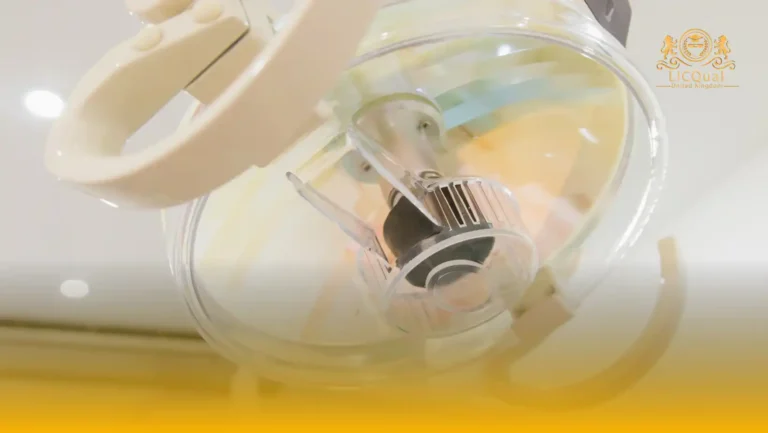The LICQual Level 3 Diploma in Nutritional Support in Critical Care (Dip Critical Care Nutrition) is a specialised qualification designed for healthcare professionals seeking to advance their expertise in nutritional management within critical care settings. This diploma equips learners with the knowledge and practical skills necessary to assess, plan, and implement nutrition strategies for critically ill patients, supporting recovery, optimising outcomes, and improving overall patient care.
Ideal for dietitians, nutritionists, nurses, and healthcare practitioners working in intensive care or hospital environments, this programme enhances career prospects while contributing to learners’ Continuing Professional Development (CPD). Learners will gain the confidence to apply evidence-based nutritional interventions, collaborate effectively with multidisciplinary teams, and make informed decisions in complex clinical situations.
Centres delivering the LICQual Level 3 Diploma in Nutritional Support in Critical Care are required to maintain the highest standards of training. This includes employing competent and qualified staff, providing access to up-to-date materials and resources, and ensuring a supportive learning environment that combines theoretical knowledge with practical application.
This qualification is perfect for motivated professionals who wish to deepen their understanding of critical care nutrition, enhance their professional credibility, and make a meaningful impact on patient outcomes. By completing this diploma, learners acquire a recognised Level 3 qualification that strengthens their skills and equips them to deliver high-quality nutritional support in critical care settings.
Course Overview
Qualification Title
LICQual Level 3 Diploma in Nutritional Support in Critical Care (Dip Critical Care Nutrition)
Total Units
6
Total Credits
60
GLH
240
Qualification #
LICQ2201050
Qualification Specification
To enroll in the LICQual Level 3 Diploma in Nutritional Education and Counseling (Dip Nutritional Education), applicants must meet the following criteria:
|
Qualification# |
Unit Title |
Credits |
GLH |
|---|---|---|---|
|
LICQ2201050-1 |
Principles of Clinical Nutrition |
10 |
40 |
|
LICQ2201050-2 |
Pathophysiology in Critical Care |
10 |
40 |
|
LICQ2201050-3 |
Nutritional Assessment and Monitoring |
10 |
40 |
|
LICQ2201050-4 |
Enteral and Parenteral Nutrition |
10 |
40 |
|
LICQ2201050-5 |
Evidence-Based Interventions and Care Planning |
10 |
40 |
|
LICQ2201050-6 |
Professional Practice and Ethical Considerations |
10 |
40 |
By the end of this course, learners will be able to:
Unit 1: Principles of Clinical Nutrition
By the end of this unit, the learner will be able to
- Explain the role of macro- and micronutrients in clinical nutrition
- Analyse energy and nutrient requirements for patients in critical care
- Evaluate the impact of nutritional status on patient recovery and outcomes
- Apply nutritional guidelines to support evidence-based practice in clinical settings
Unit 2: Pathophysiology in Critical Care
By the end of this unit, the learner will be able to
- Describe the physiological and pathological changes in critically ill patients
- Analyse how illness and injury affect metabolic and nutritional needs
- Evaluate the implications of pathophysiological changes for nutritional interventions
- Apply knowledge of pathophysiology to support clinical decision-making
Unit 3: Nutritional Assessment and Monitoring
By the end of this unit, the learner will be able to
- Conduct comprehensive nutritional assessments using standard tools and techniques
- Interpret anthropometric, biochemical, and clinical data to determine patient needs
- Monitor and evaluate changes in nutritional status over time
- Apply assessment findings to inform personalised nutritional care plans
Unit 4: Enteral and Parenteral Nutrition
By the end of this unit, the learner will be able to
- Explain the principles and indications for enteral and parenteral nutrition
- Assess risks, benefits, and potential complications of artificial feeding
- Plan and implement enteral and parenteral nutrition strategies in critical care
- Evaluate the effectiveness and safety of nutritional interventions
Unit 5: Evidence-Based Interventions and Care Planning
By the end of this unit, the learner will be able to
- Design personalised nutrition care plans based on current research and clinical guidelines
- Implement interventions that meet the specific needs of critically ill patients
- Analyse outcomes and adapt care plans to optimise patient recovery
- Apply evidence-based practice to support high-quality nutritional care
Unit 6: Professional Practice and Ethical Considerations
By the end of this unit, the learner will be able to
- Demonstrate professional conduct and ethical practice in critical care nutrition
- Communicate effectively within a multidisciplinary healthcare team
- Ensure patient confidentiality and adherence to legal and professional standards
- Apply reflective practice to improve professional skills and patient care
The LICQual Level 3 Diploma in Nutritional Support in Critical Care is designed for healthcare professionals who want to specialize in advanced nutrition management for critically ill patients. This internationally accredited program is ideal for doctors, nurses, dietitians, and allied health practitioners seeking to enhance their expertise, improve patient outcomes, and gain global recognition in critical care nutrition. Whether you are working in ICU, emergency medicine, or clinical nutrition, this diploma provides the skills and knowledge to make a lasting impact.
1. Doctors and Physicians in Critical Care
- Enhance expertise in evidence‑based nutritional support for ICU patients
- Learn advanced strategies for managing nutrition in complex medical cases
- Gain international accreditation to strengthen career opportunities
- Improve patient recovery rates through specialized nutrition planning
- Stay updated with global standards in critical care nutrition
2. Nurses and ICU Practitioners
- Develop practical skills in administering nutritional support in critical care
- Understand the role of nutrition in patient survival and recovery
- Build confidence in managing nutrition for high‑risk patients
- Earn a recognized qualification to advance nursing careers
- Access flexible online learning tailored to busy schedules
3. Dietitians and Nutrition Specialists
- Specialize in critical care nutrition beyond general dietetics
- Learn to design patient‑centered nutrition plans for ICU and emergency care
- Strengthen professional credibility with an accredited diploma
- Apply evidence‑based practices in real‑world healthcare settings
- Expand career opportunities in hospitals and international healthcare programs
4. Emergency Medicine Professionals
- Acquire skills to manage nutrition in emergency and trauma cases
- Understand the impact of nutrition on patient stabilization and recovery
- Gain recognition with a Level 3 diploma in critical care nutrition
- Improve multidisciplinary collaboration in emergency healthcare teams
- Enhance career growth with specialized training in nutritional support
5. Healthcare Educators and Trainers
- Strengthen teaching credentials with an internationally accredited diploma
- Incorporate advanced nutrition knowledge into healthcare training programs
- Provide students with practical insights into critical care nutrition
- Stay aligned with global healthcare education standards
- Expand professional influence in academic and training institutions
6. International Healthcare Professionals
- Obtain a globally recognized qualification in critical care nutrition
- Improve career mobility across international healthcare systems
- Learn flexible online modules accessible worldwide
- Gain expertise relevant to diverse patient populations
- Enhance employability in hospitals, clinics, and global health organizations
7. Allied Health Practitioners
- Broaden knowledge in patient‑centered nutritional support
- Strengthen multidisciplinary skills for ICU and emergency care teams
- Earn accreditation to boost career progression
- Apply advanced nutrition strategies in daily practice
- Contribute to improved patient outcomes in critical care environments
Centres delivering the LICQual Level 3 Diploma in Nutritional Support in Critical Care must maintain high standards of training and ensure learner success by meeting the following requirements:
- Qualified and Competent Staff: Tutors and assessors must hold relevant qualifications in nutrition, clinical care, or related healthcare fields and have practical experience in critical care settings
- Adequate Learning Resources: Centres must provide access to up-to-date textbooks, clinical guidelines, digital learning platforms, and practical tools to support effective teaching and learning
- Safe and Suitable Learning Environment: Classrooms and practical facilities must meet health and safety standards, offering a conducive environment for theoretical and practical training
- Assessment and Monitoring Systems: Centres should implement robust procedures to assess learner progress, provide timely feedback, and ensure accurate recording of achievements
- Commitment to Continuing Professional Development: Staff must engage in CPD to maintain professional knowledge and deliver current, evidence-based instruction
- Supportive Learning Environment: Centres should offer guidance, mentorship, and support services to help learners achieve their full potential
- Compliance with LICQual Standards: Centres must adhere to all LICQual policies, procedures, and quality assurance requirements to maintain accreditation
By meeting these requirements, centres ensure learners receive a high-quality, internationally recognised Level 3 qualification in critical care nutrition, fully preparing them for professional practice and career advancement within hospital and clinical environments.
Assessment and Verification
All units within this qualification are subject to internal assessment by the approved centre and external verification by LICQual. The qualification follows a criterion-referenced assessment approach, ensuring that learners meet all specified learning outcomes.
To achieve a ‘Pass’ in any unit, learners must provide valid, sufficient, and authentic evidence demonstrating their attainment of all learning outcomes and compliance with the prescribed assessment criteria. The Assessor is responsible for evaluating the evidence and determining whether the learner has successfully met the required standards.
Assessors must maintain a clear and comprehensive audit trail, documenting the basis for their assessment decisions to ensure transparency, consistency, and compliance with quality assurance requirements.







